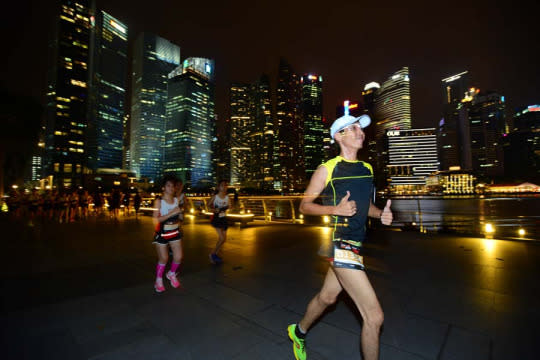Are late night marathons bad for your health?

(Runners during the Osim Sundown Marathon. Photo: HiVelocity Events)
By Philip Fenton
On the morning of 2 August, an estimated 20,000 competitors will be pulling on their running shoes to take part in the 2XU Compression Run.
But aside from the 21.2km course along the East Coast Parkway, there’s an additional challenge: The 4.30am start time.
In fact, most races in Singapore longer than 10km start between midnight and 5am.
The Sundown Marathon, held earlier in July, started at 1am.
So why are races in Singapore held at such unearthly times?
Michelle Ng, the marketing manager at 2XU organiser Pink Apple Pte Ltd, says the main reason is because of Singapore’s weather which tends to be hot all year around.
“We look at the demographics of the runners, think about what time they’re going to be finishing, and then work back from there,” she explains. “You don’t want large numbers of people running long distances when it might be too hot.”
Organisers also have to agree on road closures with local authorities who have to balance the needs of runners and motorists. Roads along the running route are quieter in the early mornings, hence the reason for the early starts.
Late night stress on the body
Running any long distance event puts a strain on the body, but factor in a start time when your system expects to be fast asleep, and you’re increasing that stress further.
According to Mihaly Szebeledi, a personal trainer at Pure Fitness and himself a keen runner, it’s actually the late-night events that are worse than the early morning ones.
“Your body goes through natural cycles during the day,” he says. “Anywhere from 6am to 9-10am is the best time to work out, so if you’re starting a race at 4 or 5am it’s not that far out.
“Around 10pm your body starts to rise again. It might seem like a funny time, but you can still perform pretty well. The problem is when you have races later than that: it’s not that healthy. You’re interrupting your body’s natural repair cycle,” he explained.
That’s not to say that a late night race every now is likely to cause any more health problems than staying out late with your friends.
As Szebeledi points out, runners should probably not expect to beat their personal best at that time.
How to prepare for a late night marathon
For lawyer and experienced runner Rahul Bhandari, the trick is to get into a routine ahead of the race.
“My weekend long runs are usually early in the morning so I’m used to training before it gets too hot,” he says.
“For races that are very early, I sleep early the night before so that I have had adequate sleep and feel rested and energised. As long as I’ve slept well, I am happy to run a race before sunrise so the 4.30am start is fine!”
Meanwhile, Szebeledi said runners should get into a routine at least two weeks before so it is less of a shock to the system.
And lastly, no matter how tempting it may seem, don’t skip a proper breakfast in exchange for an extra 30 minutes in bed.
He says, “I always tell my clients to wake up early and eat a proper breakfast, something with carbohydrates and low GI, like oats. That’s going to do you far more good than a few more minutes’ sleep.”

